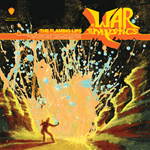|
|
 |
Dusted Reviews
Artist: The Flaming Lips Album: At War With The Mystics Label: Warner Brothers Review date: May. 5, 2006 |

|
|
|
 |
The Flaming Lips are calculated risk takers. Nobody would accuse them of being conventional or complacent, but it's easy to overestimate the magnitude of their experimental bent. Part of the reason they branch out so well is that they do it in focused and finite ways. They're into tampering with the means of production, but the songs remain accessible and listener-friendly at heart; even Zaireeka wasn't so very strange once you assembled (or approximated) the four CD players necessary to hear it. On the whole, their fascinations have always been sublimated to safe, judicious realms, sometimes provocative but almost always palatable. Maybe it's conscientious, maybe apathetic; either way, anything much deeper is answerable to their just being kind of odd.
So while it's safe to say the Flaming Lips have been evolving since they started paying attention to the properties and possibilities of sound (around the time of the parking lot and boombox experiments, say), it's a bit superfluous to dwell on songcraft. The Soft Bulletin recast their trademark fuzzy catatonia on a huge scale (thanks largely to the someone suddenly realizing what a good drummer Steven Drozd was) and Yoshimi Battles The Pink Robots fleshed out the conceptual angles, but both were understandable, relatively logical as progressions. They preserved the wild-eyed charm of the era before (and after, why not) "She Don't Use Jelly" – just concentrated and polished and future-proofed it somewhat.
At War With The Mystics does not come out of left field, but much more than its predecessors it seems designed to sound like it does. It's the Lips' furthest-out record in a long time, because that compulsion to tweak strange little things has penetrated through to the songs themselves. It covers too much ground, spreads its inventive energies too thin. It expands on its predecessors, like its predecessors did, but it's two or three albums' worth of expansion in one. Something is lost in the swiftness. The soulful parts feel contrived and curiously heavy, the progginess is a bit stifling. The risks are smaller and more plentiful, and they don't always pay off. Just because you have the credibility to make your own Speakerboxxx/The Love Below doesn't mean it's a good idea.
There is, for instance, the maniacal doo-wop lining of "The Yeah Yeah Yeah Song (With All Your Power)," or the sharp guitar buzz under the breathy falsetto of "Free Radicals (A Hallucination of the Christmas Skeleton Pleading With A Suicide Bomber)," or the flute-flecked interstice in the middle of the seven-minute "The Sound of Failure/It's Dark... Is It Always This Dark??" These aren't ornamental distractions, they're elemental properties; the oddity isn't in the technique or the context but in the melody and instrumentation. It's not that they universally don't work – "It's Dark" ends on a pleasing atmospheric note, "The Yeah Yeah Yeah Song" is a worthwhile trip before it wears out its welcome. It's more that what should be nuances call attention to themselves by prevalence as much as prominence; it's not that the songs have parentheses in their names, but that they embrace the druggy self-indulgence that parentheses tend to entail.
At base some of the songs are still quite good, but it's significant that the album's two best numbers are the smallest leaps forward. "My Cosmic Autumn Rebellion (The Inner Life As Blazing Shield of Defiance and Optimism As Celestial Spear of Action)" lifts its chirping, pastel-tinted mood from The Soft Bulletin and its vocal melody from most of Yoshimi; lead single "The W.A.N.D. (The Will Always Negates Defeat)" sounds like both channeled through Beck-style funk. What makes these songs good – the overdriven organ solo and the skittering scratch accents, respectively – are throwbacks to a familiar heritage, rather than appropriations of some distant minstrelsy. By contrast, "It Overtakes Me" spins an interesting brand of 21st-century paranoia, but its distinguishing points deflate its elegance and gravity: the underwater Motown backing vocals, the pitchbent voice bellowing about black holes, the buzz that sounds exactly like your cell phone vibrating.
Nonetheless, there is much more to At War than Dave Fridmann's gauzy, starlit production, and with headphones (or psychotropic drugs) it could be the most aurally stimulating pop record since OK Computer. The problem is that, while the ambition and meticulousness is comparable, these songs are too often listless or overblown, and the experimentation comes to feel needless. The subtlety is thin and the candor is awkward, whether or not this is intentional; if Yoshimi was about death and The Soft Bulletin was about madness, they made their points with a certain dreamy subtlety. This record is quite unabashedly about the Bush regime, and articulates itself with lyrics like ”So we cannot know ourselves / Or what we'd really do / With all your power” or ”But you're going international / They're gonna call the cops / You're turning into / A poor man's Donald Trump”. Sincerity from the Flaming Lips would do just as well as their ironic Jesus-freakery or blissed-out starchild ramblings, but At War is not clearly sincere; it's bemused and at times tactless, maybe mocking, or maybe just weak. It's no worse than an opulent misstep for a band that deserves its missteps, but it mostly illuminates their strong suits by omitting them.
By Daniel Levin Becker
|







